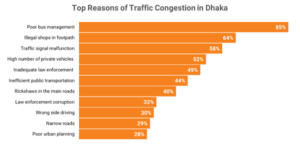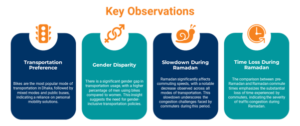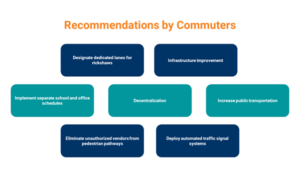Dhaka’’s traffic has been accused of being among the world’s slowest, a reputation exacerbated during the holy month of Ramadan. The US National Bureau of Economic Research (2023) found Dhaka to be the slowest city in the world. Every day, around 2.1 crore people in Dhaka rely on various public transportation modes for their daily commutes, making them the primary group impacted by this ongoing traffic congestion. This issue has drawn significant attention from stakeholders such as Real Estate Developers, Logistics Companies, and FMCG businesses, especially concerning their supply chain and transportation operations.
To offer insightful information about the daily struggles faced by commuters in Dhaka city, Innovision Consulting designed the interactive dashboard “Dhaka Traffic Trends: Ramadan versus Non-Ramadan” to reveal traffic patterns. Data from 650 participants, randomly selected from relevant Facebook groups, sheds light on time wastage, commute experiences, and congestion. Limitations include the exclusive focus on active Facebook users and the inability to capture all aspects of traffic dynamics. The findings are detailed in this interactive dashboard.
According to commuters in Dhaka, the top reasons for traffic congestion during Ramadan include poor bus management, illegal shops encroaching on footpaths, traffic signal malfunctions, a high number of private vehicles, inadequate law enforcement, inefficient public transportation, rickshaws congesting main roads, law enforcement corruption, wrong-side driving, narrow roads, and poor urban planning.

The study also highlights the impact of Ramadan on traffic congestion, with a notable decrease in commuting speeds observed across all modes of transportation during this period. This slowdown underscores the congestion challenges faced by commuters, resulting in substantial time losses compared to non-Ramadan times.

To address these challenges, the commuters recommended several measures, including implementing policies to restrict rickshaws from main roads, deploying automated traffic signal systems, eliminating unauthorized vendors from pedestrian pathways, and enhancing public transportation infrastructure. Additionally, initiatives such as dedicated shuttle services for schools and separate schedules for school and office hours can help alleviate congestion and promote sustainable urban mobility.

Overall, as Dhaka continues to grow and evolve, it becomes increasingly imperative for stakeholders to implement innovative solutions and proactive measures to alleviate congestion, enhance public transportation, and promote sustainable urban mobility for all. Through collaborative efforts and community engagement, Dhaka can strive towards a future where Ramadan traffic challenges are mitigated, and residents can feel tranquillity during this auspicious time.
Contributors: Fahmida Faruque, Soumik Siddique Plaban, and Fazlul Karim Chowdhury, FMVAⓇ in the Data Analytics & Emerging Frontiers Portfolio at Innovision Consulting.